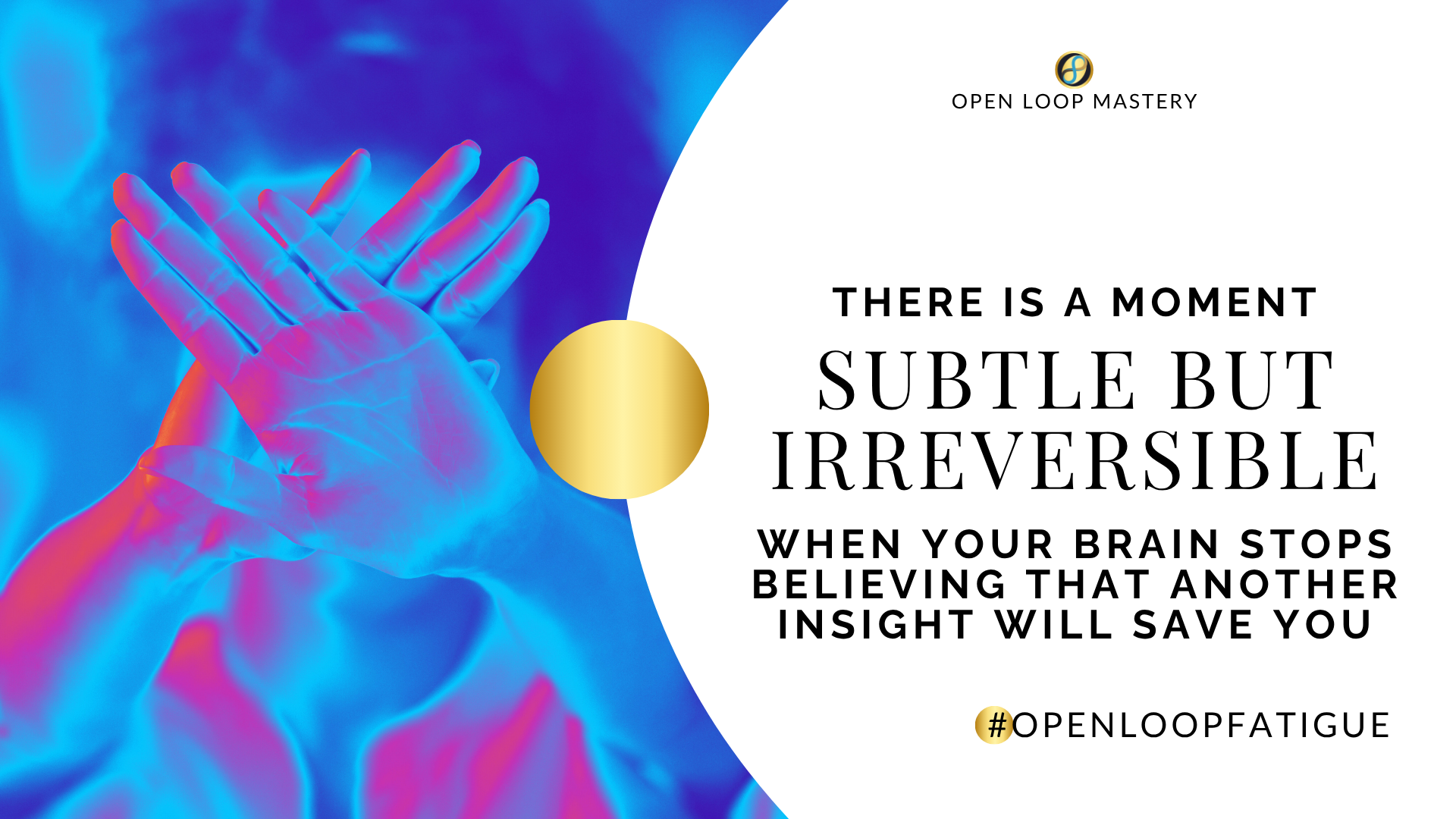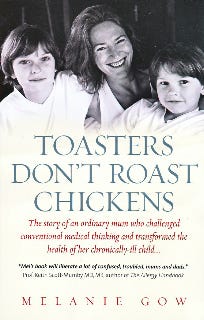The End of Certainty
The End of Certainty: Why Thinking More Doesn’t Work Anymore. What if more thinking isn’t the answer? A story for smart, self-aware people stuck in insight overload—and the wisdom that comes after knowing.

Why the smartest minds are unraveling—and the wisdom that saves them
There is a moment—subtle but irreversible—when your brain stops believing that another insight will save you.
It’s not quite despair.
It’s not depression.
It’s the quiet, aching recognition that you’ve reached the outer edge of thinking… and still feel lost.
You did everything right.
You read the books.
Mastered the frameworks.
Built a life on insight.
Maybe you became the go-to person for clarity—strategic, articulate, certain.
You’ve even thrilled at how ChatGPT, Claude, or Perplexity help you not just to think better—faster, sharper, more completely. What an incredible relief, right?
So why are you now unraveling in silence?
Why does knowing more bring diminishing relief?
This is not a crisis of intelligence.
You’ve simply outgrown certainty.
And the way back isn’t more knowledge.
It’s a different kind of knowing.
I had done everything by the book.
When my eldest son was chronically ill, I went to doctors. Read the leaflets. Trudged to clinics. Repeated the rituals of treatment so often I could perform them in my sleep. We scrubbed the house, boiled the bedding, eliminated soft toys, tracked doses. Still, nothing truly worked.
Then, out of sheer desperation, I reached for something I’d not had time (between doing all ‘the things’) to pay attention to—a book on homeopathy. I skipped the philosophy, the theory, the history. I went straight to the symptom index.
And there he was.
Not just his symptoms, but Ben’s whole story.
His temperament. His night sweats. What made him worse. What made him feel better. The way he reached for me when he was afraid. The coughs. The way he cried. The way he needed to be watched, just in case he stopped breathing.
It didn’t offer certainty. It offered coherence. And, I leveraged it!
Two weeks later, Ben’s doctor examined him three times before leaning back in disbelief.
“I don’t know what you’ve done,” he said, “but this child is well.”
That moment broke something open in me. I realised what I’d really been chasing this whole time wasn’t just answers.
It was the illusion of safety that certainty promised.

And I’m not alone. A team at Harvard Medical School, led by Dr. Harold Bursztajn, has shown that treatments with any real certainty are rare. Even trails—the most trusted tools of modern medicine—are often inconclusive, and usually come with side effects we fail to name.
Prof. Gerd Gigerenzer, long-time director at the Max Planck Institute for Human Development, and currently the Director of the Harding Center for Risk Literacy at the University of Potsdam and a partner at Simply Rational - The Institute for Decisions, calls this our illusion of certainty.
We’re taught to believe there’s always one best answer, one right treatment, one guaranteed result.
But this belief, Prof. Gigerenzer warns, makes us less capable of deciding for ourselves.
When you seek certainty to feel safe, you will always find yourself on the edge of unraveling when the answers stop working.
What saved Ben and I wasn’t a protocol.
It was the moment I stopped asking What’s wrong with him?
And started asking, What’s Ben’s whole story?
That was the shift.
- From treating symptoms to witnessing the child.
- From chasing solutions to trusting observation.
- From information... to wisdom.
I wrote about this in my first book, Toasters Don’t Roast Chickens, The truth is: we were never confused.
We were overwhelmed by too many partial truths, none of which could carry the whole story of our lived experience.


Meaning-making in a Post-certainty World: A New Way to Know
If certainty was the old currency of value, coherence is the new one.
We were never meant to live inside loops of perpetual insight.
We were meant to close them.
But the modern mind has been conditioned to confuse certainty with safety—and knowledge with progress.

So we keep reaching for something new to know. Something to fix it. Something to name it. Something to finally explain it so we can rest.
We never learned how to rest in the not-knowing.
We never learned how to witness a story as it unfolds, instead of diagnosing it mid-sentence.
But wisdom doesn’t arrive through certainty.
It arrives through relationship.
Through attunement.
Through pattern recognition that no checklist can teach.
We didn’t need more insight. We needed a system for making meaning.
In my case, the shift didn’t come from learning something new.
It came from seeing Ben’s whole story—not just the parts the system was trained to recognize.
It came from noticing what no protocol was ever built to notice: the aliveness in his eyes when something worked, the way he collapsed in my arms when nothing did.

The Insight I return to Again and Again
You don’t need more answers. You need a more useful story.
That’s where Open Loop Mastery begins.
It isn’t a mindset.
It isn’t another strategy deck.
It’s a cognitive map for those living at the edge of what knowing used to mean.
At its core, Open Loop Mastery teaches you how to:
- Recognize when you’re stuck in a story that once kept you safe but no longer fits
- Name the loop for what it is—a pattern, not a personal failure
- Locate the emotional root, the story beneath the productivity habit or certainty addiction, the rumination, the resistance.
- Reframe the pattern into a coherent narrative you can grow inside of
- Act from clarity—not urgency, not fear, not default
It’s not about fixing your thoughts.
It’s about meeting the part of you that never stopped scanning for resolution—and giving it a better story .
Because ‘story’ isn’t just how we explain life.
It’s how we store experience, how we navigate uncertainty, and how we choose who we become next.

Narrative Intelligence: The Original Way of Knowing
And this is the part no one told us:
Narrative Intelligence isn’t a skill. It’s our original intelligence.
It’s how the human brain has always made sense of a changing world—long before data, frameworks, or diagnoses.
But somewhere along the way, we stopped trusting it.
We trained ourselves to privilege
- abstraction over intuition,
- theory over story,
- knowledge over wisdom.
Now, as certainty collapses, it’s clear what we must return to:
A way of knowing that is relational, embodied, and emotionally intelligent.
Open Loop Mastery is a Narrative Intelligence system for post-certainty living.
It helps you see what your mind is really trying to resolve—so you can create coherence, not just consume more content.
The Loop Mastery Quadrant gives structure to the unresolved, and language to the invisible patterns most models miss.
And the only way to do that… is to stop seeking control, and start creating coherence.
That’s what Open Loop Mastery was born to offer—not another framework to memorize, but a way to locate yourself inside a story worth continuing.
One that closes loops, instead of adding more tabs to the mental browser you can’t shut down.
It isn’t about finding better thoughts.
It’s about learning to listen to the parts of you that already know—but were never taught how to speak in certainty’s language.
This is what we’re reclaiming.
Not just clarity. But a way home to ourselves.

The End of Certainty
Why thinking more won’t save you this time
You’ve done the work. You’ve read the books. You’ve mastered the frameworks.
But you’re still not home.
This is the beginning of something else.
🌀 Open Loop Mastery is a practice in Narrative Intelligence. A way to close what’s unresolved, so you can create a life of coherence—not just conclusions.
🔜 Up Next: The Curiosity Trap
The hidden loop behind overthinking, self-help fatigue, and why seeking more insight may be keeping you stuck.
Subscribe for free to follow this as it unfolds.
#Narrative Intelligence #Open Loop Mastery #The End of Certainty #Personal Growth #Beyond Mindset #Overthinking #Story as Intelligence

